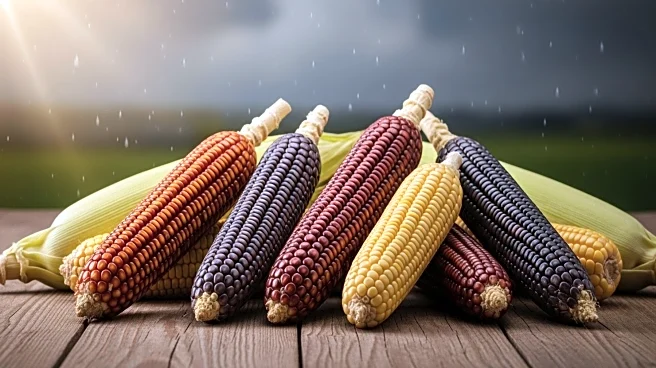What's Happening?
The International Maize and Wheat Improvement Center (CIMMYT) is experiencing a surge in demand for its stress-tolerant maize varieties, which are designed to withstand heat, drought, diseases, and pests. In 2025, 85 organizations applied for licenses to register and commercialize CIMMYT's maize hybrids and open-pollinated varieties, marking a 17% increase from the previous year. These varieties are particularly beneficial for smallholder farmers in sub-Saharan Africa, where maize is a staple crop. CIMMYT's breeding program focuses on resilience, ensuring that the seeds perform well under challenging conditions.
Why It's Important?
The growing demand for CIMMYT's maize varieties highlights the urgent need for climate-resilient crops in regions facing erratic weather patterns and emerging agricultural challenges. By providing farmers with seeds that can thrive in adverse conditions, CIMMYT is contributing to food security and economic stability in developing countries. The organization's approach, which includes licensing to public and private entities, ensures that improved seeds reach those who need them most. This model not only supports agricultural productivity but also fosters sustainable practices, making it a critical component in addressing global food security issues.
What's Next?
As demand for stress-tolerant maize continues to rise, CIMMYT is likely to expand its partnerships with seed companies and national systems to facilitate the distribution of these varieties. The organization may also seek additional funding to support its breeding programs, ensuring that they can continue to develop high-performing seeds. Policymakers and donors are encouraged to invest in public breeding initiatives, which have demonstrated significant economic benefits. The focus will remain on getting better seeds into the hands of farmers, enabling them to thrive despite climate uncertainties.
Beyond the Headlines
The success of CIMMYT's maize varieties underscores the importance of collaboration between public and private sectors in agricultural development. By working together, these entities can accelerate the adoption of innovative solutions that address pressing challenges like climate change and food insecurity. The model of licensing and sublicensing ensures that improved seeds are accessible to a wide range of farmers, promoting inclusivity and equity in agricultural advancements. This approach not only benefits individual farmers but also contributes to broader economic growth and stability in affected regions.









